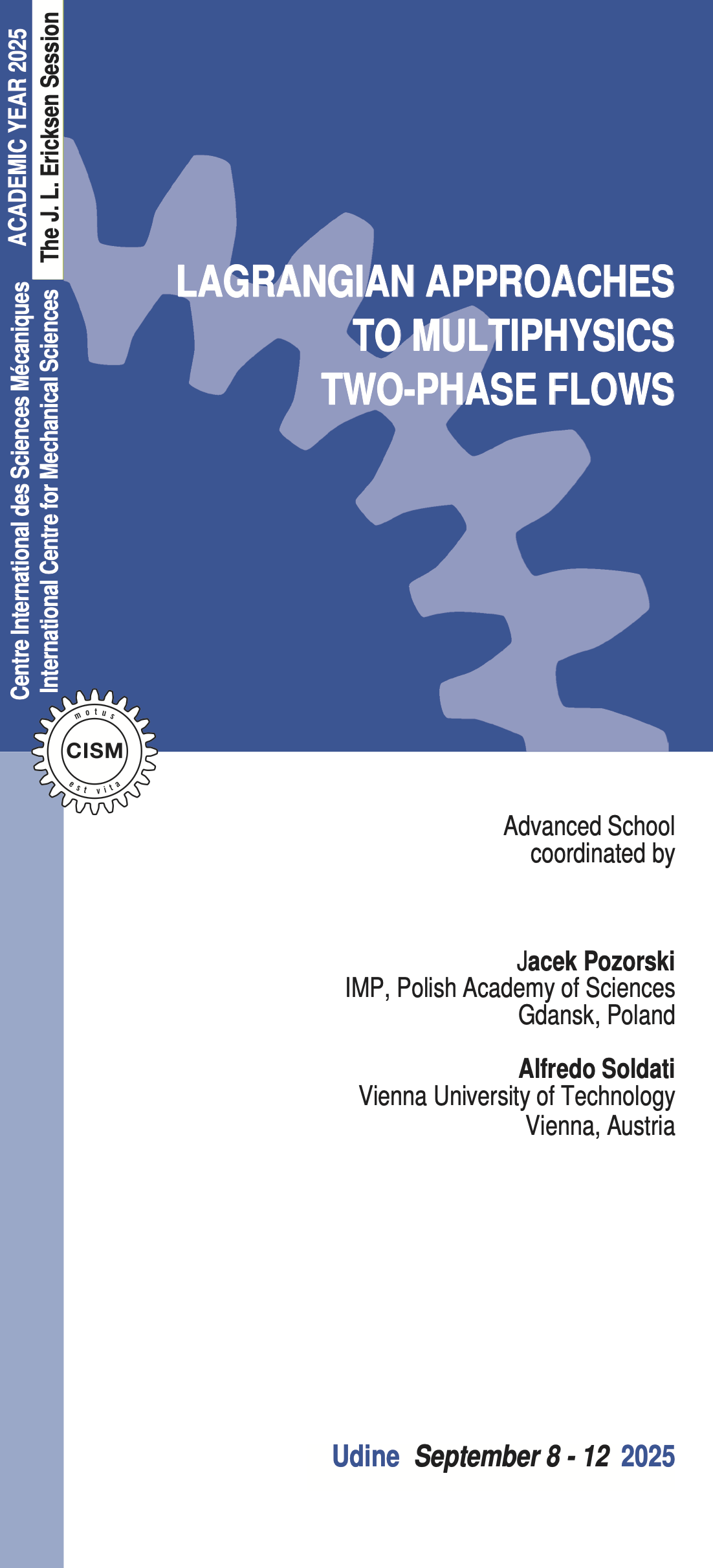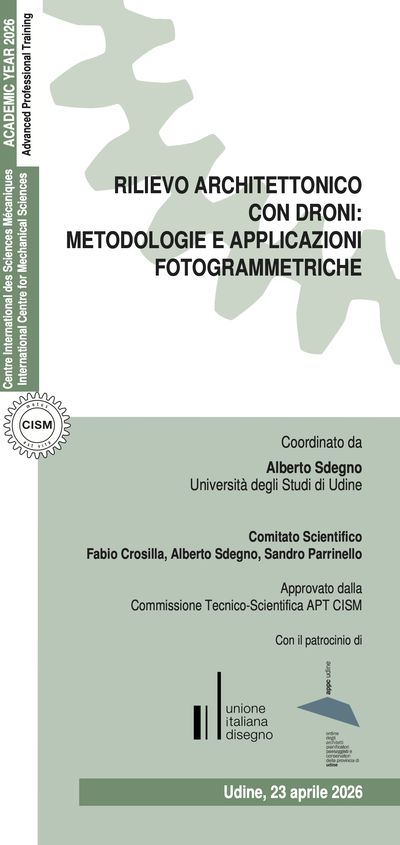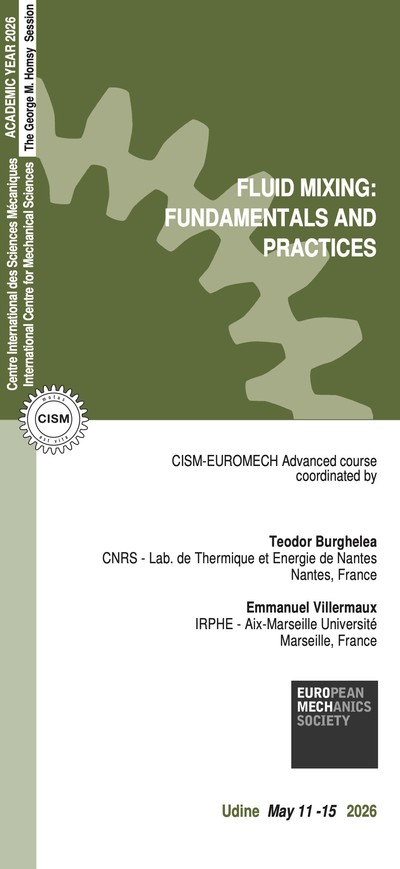Multiphase flows are common in nature and engineering. Atmospheric flows often involve the dispersion of droplets or solid particulate matter (dust, sand, ice crystals in clouds); marine systems are populated by plankton, sediments or microplastics. Industrial applications of disperse flows include particle separators, filtration systems, atomisers and combustion devices, spray dryers, bubble columns; interfacial and free-surface flows are widespread in chemical and process industry.
To address the complexity associated with such flows, diverse phenomena are combined: flow dynamics (including turbulence or microfluidics), transport of dispersed phase, heat transfer and phase change, chemical reactions, surface science (particle deposition, resuspension or agglomeration) or even biology of organic objects. These multiphysics processes may span a wide range of spatial and temporal scales (from nano through macro to geophysical ones).
The course will focus on Lagrangian approaches. They are often methods of choice to treat the particulate phase transport and polydispersity; they may also be used, in terms of so-called particle-based methods, for the macroscopic description of fluid motion. Looked at from this perspective, the course should nicely complement a typical curriculum on fluid dynamics and CFD modelling to provide a broader view, next-to (but not off) the beaten track, especially valuable for PhD candidates.
The course will cover a range of Lagrangian techniques in use, with a special emphasis on particle-laden turbulence. It will include lectures and hands-on sessions on Particle Image Velocimetry and Particle Tracking Velocimetry that are widely used to measure dispersed two-phase flows. On the other hand, non-spherical tracer particles can be used to quantify turbulence. The physics of particle dispersion, aggregate breakup, and anisotropic particle dynamics will be covered.
In terms of modelling and computation, the lectures will describe hybrid Euler-Lagrange approaches for multiphysics two-phase flows, in particular disperse turbulent ones. The course will address particle-resolved and particle-modelled Direct Numerical Simulations (PR-DNS, PM-DNS), Large-Eddy Simulations (LES) with particle tracking, which may include modelling of the subscale phenomena, as well as statistical (RANS and one-point PDF) approaches with stochastic Lagrangian models to account for the missing information on turbulence. Smoothed Particle Hydrodynamics (SPH) will be presented as a representative of a particle-based numerical approach, including multiphase SPH, along with some fundamental issues.
Through these various examples, similarities and differences between particle-based descriptions will be discussed, considering the multiphysics nature of two-phase flows. The lectures will shed light on experimental issues (including uncertainty assessment), modelling challenges (point-particle vs. particle-resolved models, unresolved scales handling), and computational approaches (including hybrid ones).
Bäbler M. U. et al. (2015). Numerical simulations of aggregate breakup in bounded and unbounded turbulent flows. Journal of Fluid Mechanics, 766, 104-128.
Voth G. & Soldati A. (2017). Anisotropic particles in turbulence. Annual Review of Fluid Mechanics, 49, 249-276.
Monchaux R. Bourgoin M. & Cartellier A. (2012). Analyzing preferential concentration and clustering of inertial particles in turbulence. International Journal of Multiphase Flow, 40, 1-18.
Raffel M. Willert C. E. & Kompenhans J. (1998). Particle image velocimetry: A practical guide. Springer.
Shnapp R. (2022). MyPTV: A Python package for 3D particle tracking. Journal of Open Source Software, 7(75), 4398.
Minier J. P. (2015). On Lagrangian stochastic methods for turbulent polydisperse two-phase reactive flows. Progress in Energy and Combustion Science, 50, 1-62.
Pozorski J. & Olejnik M. (2024). Smoothed particle hydrodynamics modelling of multiphase flows: An overview. Acta Mechanica, 235, 1685-1714.
Tryggvason G. Scardovelli R. & Zaleski S. (2011). Direct numerical simulations of gas–liquid multiphase flows. Cambridge University Press.
Supporting lectures for Prof. Soldati
5 lectures on:
Lagrangian turbulence: statistical description of Lagrangian dynamics, single particle dispersion, pair dispersion; turbulent transport of (spherical) inertial particles: single particle dynamics, turbulent settling, preferential concentration and collective effects.
5 lectures on:
Overview of numerical approaches for particle-resolving simulations; Euler-Lagrange methods with immersed boundaries for Direct Numerical Simulations (DNS) of particle-laden and bubble-laden flows; sub-scale models for collision, coalescence and breakup; use of particle-resolving DNS for statistical modelling; application to sediment dynamics, extension to three-phase flows in flotation.
Lectures: 4 + 2 hands-on session
Breakup of aggregates in flows: from simple to turbulent flows; numerical approaches for the breakup of small, spherical or anisotropic particles in turbulence; modelling methods for the breakup of rigid aggregates in turbulent flows. Hands-on session: analysis of Lagrangian data from DNS.
Lectures: 4 + 2 hands-on session
Overview of Lagrangian particle tracking experimental methods from theoretical, computational, and hardware perspectives. Hands-on sessions on two-phase Particle Image Velocimetry (PIV) and Particle Tracking Velocimetry (PTV) methods for 2D/3D measurements, using open source software OpenPIV and OpenPTV; application on algae, navigation in odorant landscape.
5 lectures on:
Introduction to Lagrangian approach and particle methods in fluid dynamics; Euler-Lagrange modelling of turbulent dispersion; Large-Eddy Simulation (LES) with point particles considering sub-scale effects (one-point stochastic models and structural-type models); Smoothed Particle Hydrodynamics (SPH) particle method: introduction and selected applications to two-phase flows.
5 lectures on:
Overview of particle dynamics in turbulent flows; influence of shape on the motion of anisotropic and non-axisymmetric particles; experimental determination of motion of shape-influenced particles; use of non-spherical tracer particles to measure turbulence features.
ADMISSION AND ACCOMMODATION
The course is offered in a hybrid format, allowing participants the flexibility to attend either in person or remotely via the Microsoft Teams platform.
Admission to on-site attendance is granted on a first-come, first-served basis to comply with the capacity of the lecture room.
Application forms should be submitted online through the website: http://www.cism.it. A confirmation message will be sent to participants whose applications are accepted.
Registration fees:
- Early Bird On-Site Participation: € 650.00 + VAT* - Deadline: July 8, 2025
- Late On-Site Participation: € 800.00 + VAT* - Deadline: August 26, 2025
- Live Streaming Online Participation: € 250.00 + VAT* - Deadline: August 26, 2025
On-site participation includes a complimentary bag, five fixed menu buffet lunches, hot beverages, downloadable lecture notes.
Online participation includes downloadable lecture notes.
Upon request, and subject to availability, a limited number of on-site participants can be accommodated at the CISM Guest House for € 35 per person per night. To request accommodation, please contact foresteria@cism.it.
CANCELLATION POLICY
Applicants may cancel their registration and receive a full refund by notifying the CISM Secretariat in writing (via email) no later than:
- July 8, 2025, for early bird on-site participation;
- August 8, 2025, for late on-site participation;
- August 26, 2025, for online participation.
No refunds after the deadlines. Cancellation requests received before these deadlines and incorrect payments will be subject to a € 50.00 handling fee.
GRANTS
A limited number of participants from universities and research centers who do not receive support from their institutions can request a waiver of the registration fee and/or free lodging.
Requests should be sent to the CISM Secretariat by July 8, 2025, along with the applicant's curriculum vitae and a letter of recommendation from the head of the department or a supervisor confirming that the institute cannot provide funding. Preference will be given to applicants from countries that sponsor CISM.





